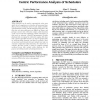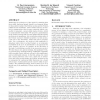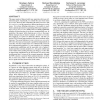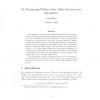151
click to vote
FOCS
2006
IEEE
15 years 8 months ago
2006
IEEE
Combinatorial allocation problems require allocating items to players in a way that maximizes the total utility. Two such problems received attention recently, and were addressed ...
88
Voted
INFOCOM
2007
IEEE
15 years 8 months ago
2007
IEEE
Abstract— TCP/IP can be interpreted as a distributed primaldual algorithm to maximize aggregate utility over source rates. It has recently been shown that an equilibrium of TCP/I...
118
Voted
HPDC
2007
IEEE
15 years 8 months ago
2007
IEEE
Utility functions can be used to represent the value users attach to job completion as a function of turnaround time. Most previous scheduling research used simple synthetic repre...
115
click to vote
GLOBECOM
2007
IEEE
15 years 8 months ago
2007
IEEE
In traditional call admission control (CAC) schemes, mobile users are always the passive roles during the admission procedures and the base station determines whether to admit o...
137
click to vote
ICAC
2008
IEEE
15 years 8 months ago
2008
IEEE
—Large scale production grids are an important case for autonomic computing. They follow a mutualization paradigm: decision-making (human or automatic) is distributed and largely...
123
click to vote
SIGECOM
2009
ACM
15 years 9 months ago
2009
ACM
Restricting the preferences of the agents by assuming that their utility functions linearly depend on a payment allows for the positive results of the Vickrey auction and the Vick...
121
click to vote
SAGT
2009
Springer
15 years 9 months ago
2009
Springer
Congestion games—in which players strategically choose from a set of “resources” and derive utilities that depend on the congestion on each resource— are important in a wid...
106
Voted
ATAL
2009
Springer
15 years 9 months ago
2009
Springer
This paper analyzes bilateral multi-issue negotiation between selfinterested agents. Specifically, we consider the case where issues are divisible, there are time constraints in ...
105
click to vote
ALDT
2009
Springer
15 years 9 months ago
2009
Springer
Abstract. Several schemes have been proposed for compactly representing multiattribute utility functions, yet none seems to achieve the level of success achieved by Bayesian and Ma...
105
Voted
STOC
2006
ACM
16 years 2 months ago
2006
ACM
We consider the problem of maximizing welfare when allocating m items to n players with subadditive utility functions. Our main result is a way of rounding any fractional solution...




